






In memory of my father
Norman Holmes (1911-42)
Electrical Mechanic 5th Class (C/MX 89523) on HMS Hecla
"My
father was the youngest of four children, two boys and two girls, born
to George Arthur Holmes and Florence Holmes, my grandparents. They
lived in Hazel Grove, south of Stockport, Manchester, near the
Derbyshire Peak District. He married my Mother, Hilda Weatherby, at
Monton Methodist Church on the 9 May 1940. They were both active
members of Egerton Lawn Tennis Club. I do not know where he was
educated or even where he met my mother, perhaps at tennis or Youth
Holiday Fellowship holidays that were very popular at that time in the
North of England. He was working as an insurance clerk for the Co-op
Insurance Society, Manchester, when he volunteered for war service as
an Ordinary Seaman (OD) on 15th April 1941. I was born in Eccles,
Lancashire on 25th November 1941, less than a year before his death, so
sadly never knew him." David Golby
**** **** **** **** **** ****
Norman Holmes did his three months basic training from April - June 1941 at HMS Glendower, a former Butlin's holiday camp at Pwllheli, Caernarfonshire, in North Wales followed by three weeks at HMS Pembroke, the shore base at Chatham.
Despite
having worked as a clerk before the war and having no previous
experience of electrical work he was selected for training as an
electrical mechanic and spent nearly four months at HMS Southampton,
Victory V, in the South Western Hotel, in Portsmouth, acquiring a basic
knowledge of electrics, the difference between DC and AC applying it to
circuits and motors. He was then posted to HMS Vernon,
the Admiralty's Torpedo, Mining and Electrical Training Establishment,
where he applied that knowledge and furthered his training in electrics
to acquire a deeper professional understanding of his core subject
subsequently used on a vast array of electrical machinery. In May 1941
HMS Vernon had relocated to
Roedean School for Girls, Brighton, the girls having been evacuated to
Keswick in the Lake District. He was there from 8th November 1941 to
13th March 1942 and on completing his training was rated Electrical
Mechanic 5th Class and wore the anchor known as a "Killick" identifying
him as a Leading Hand on the left sleeve of his blue jacket despite
having no seagoing experience.
Norman Holmes was posted from Chatham Barracks to join HMS Hecla on the Clyde on 31st March 1942 after she had completed a short re-fit following a year as the destroyer depot ship for the Atlantic escorts at Havelfjord, Iceland.
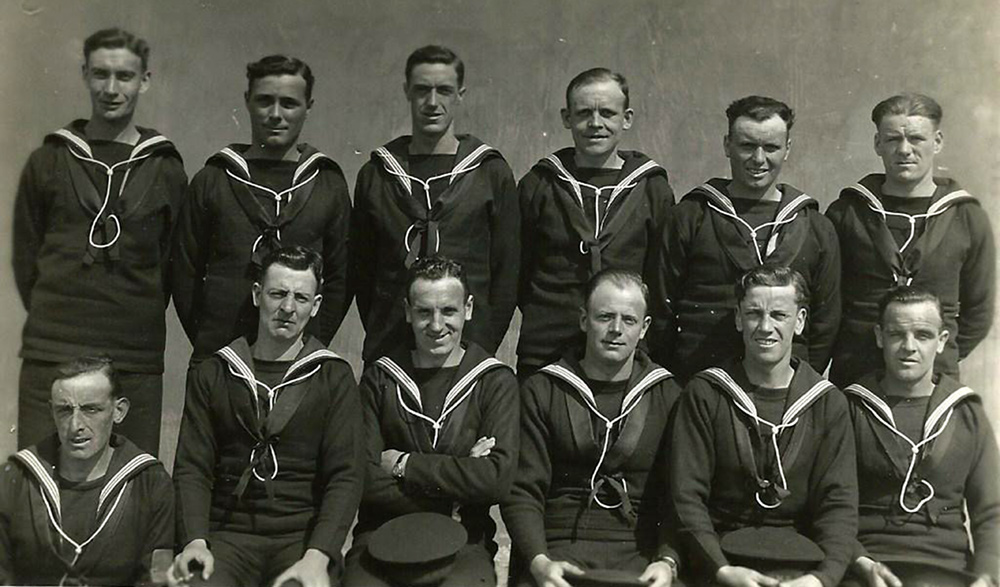
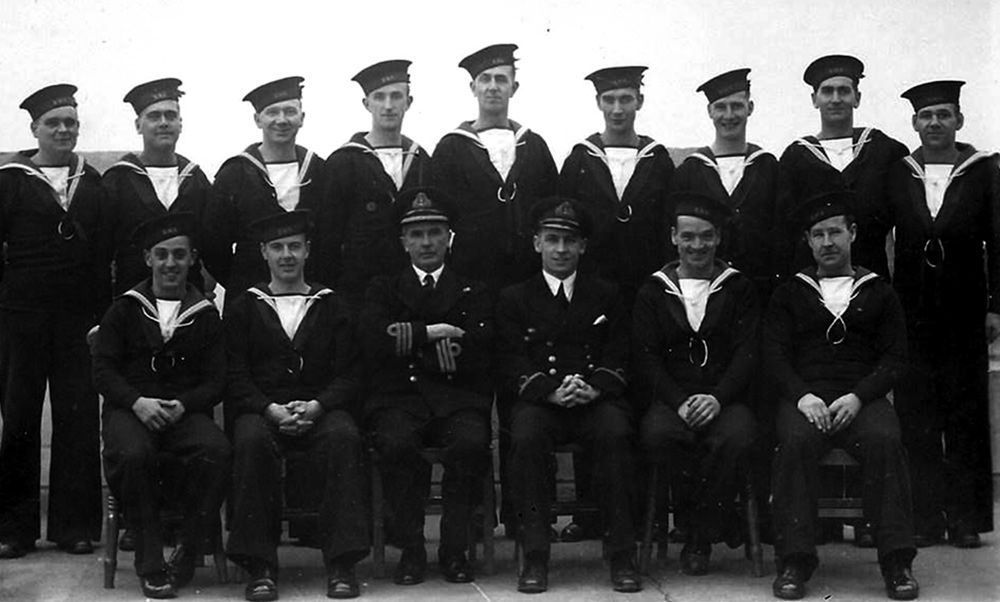
Two photographs of Norman Holmes and "shipmates" under training
Norman Holmes is first from left in the photograph taken during basic training at HMS Glendower (top) and fourth from right in the back row of the photograph at HMS Vernon (bottom)
Courtesy of David Holmes Golby
"The ship sailed in Convoy WS-18 from Liverpool/Clyde on 15th April 1942. Prior to sailing my father was given Draft Leave and I have a studio photograph of him in uniform taken on 13th April 1942, just two days before he sailed. Sadly this was to be the last my mother was to see of him. The ship was initially bound for Freetown, West Africa, to arrive 29th April 1942." David Golby
Norman's first letter home after Hecla left the Clyde was posted on arrival at Freetown, Sierra Leone, in West Africa
Norman
Holmes letters are still in their original envelopes stamped “ Received
from HM Ships and Passed by Censor” despite being some 73 years old.
They were recently discovered by a cousin of David Holmes Golby while
going through his own fathers’ papers.
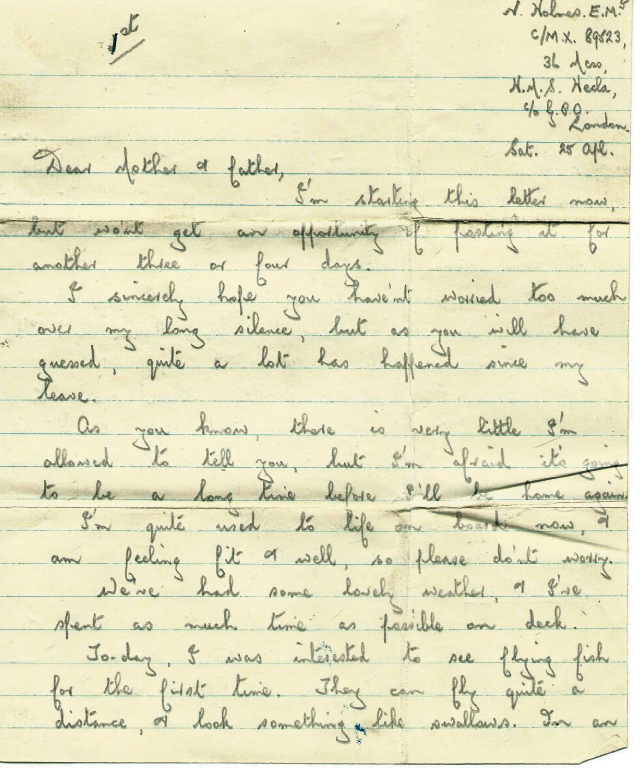
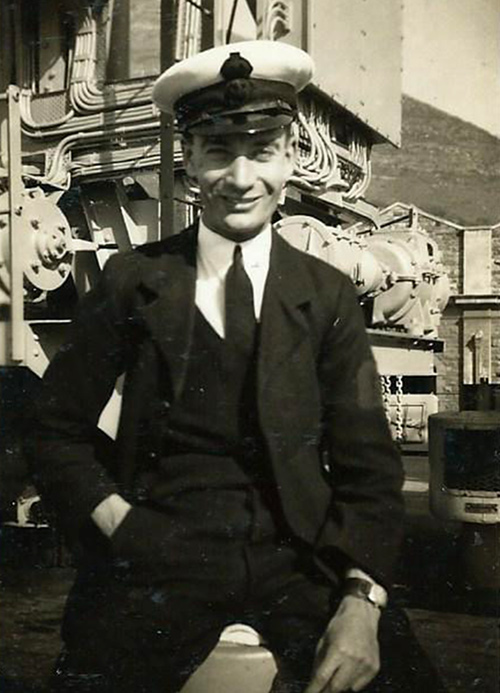
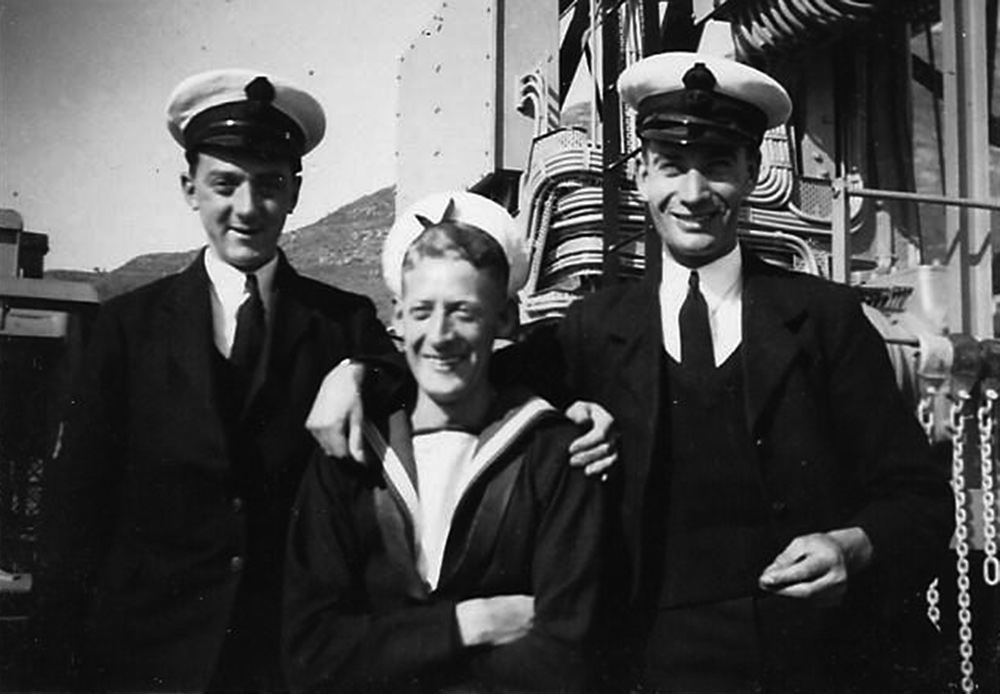
Norman Holmes on right with another Electrical Mechanic on left with 'shortie' centre
Who are these two unidentified shipmates of Norman Holmes?
Courtesy of David Holmes Golby
HMS Hecla
c/o G.P.O. London
(Somewhere at sea)
Date snowpaked out - by censor?
Dear mother & father,
I'm
starting this letter now, but it will probably be about ten days before
it is posted as we're now in the next stage of our journey.
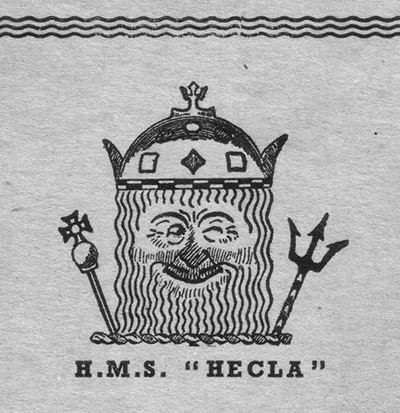 Yesterday
we had a free day for the "crossing the line" ceremony. The night
before, King Neptune spoke over the loudspeakers, and said that we were
nearing his domain and wished to know our business etc. The skipper
replied, saying that we'd come to fight the forces of evil, etc etc.
Neptune then said that he, together with his Queen & retinue would
visit the ship at 9 o'clock on Weds, morning to renew old
acquaintances, and to initiate new. A stage had been built on deck with
two chairs that tipped over backwards, fastened on the edge over a
canvas plunge.
Yesterday
we had a free day for the "crossing the line" ceremony. The night
before, King Neptune spoke over the loudspeakers, and said that we were
nearing his domain and wished to know our business etc. The skipper
replied, saying that we'd come to fight the forces of evil, etc etc.
Neptune then said that he, together with his Queen & retinue would
visit the ship at 9 o'clock on Weds, morning to renew old
acquaintances, and to initiate new. A stage had been built on deck with
two chairs that tipped over backwards, fastened on the edge over a
canvas plunge.
The costumes were exceptionally good, & also the speeches when King Neptune was received by the Skipper. The retinue consisted of fishermen, bears or other officials who administered soft soap pills to the victims, and also lathered and showered them - the lather being some kind of blue water colours.
The first victims were officers who had never crossed the line before, & it was surprising how many hadn't - the Commander for one! As a matter of fact one fellow in our Mess has spent over twenty four years at sea and this is the first time he's crossed! Yet I was on my first trip!
The fishermen scoured the ship for anybody trying to avoid initiation, while the bears - dressed in rope skirts - were in the plunge waiting for the victims.
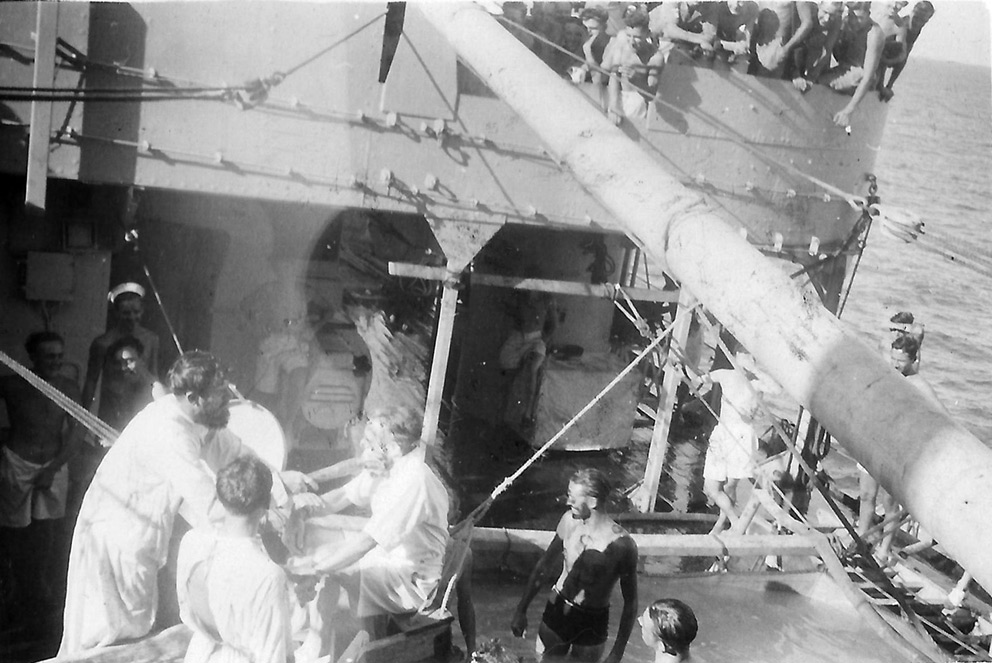
The "Crossing the Line" ceremony was photographed by Kenneth Collings
Neptune and his Queen Amphitrite both survived the torpedoing of HMS Hecla
The Commander was the first to be initiated and though he was spared the plunge, a pill was administered, and his face and hair were absolutely plastered with blue - his eyes must have been full of it. Actually, the officers had the worst 'doing' of the lot as all were well and truely ducked. THE M.O. - charged with being an 'inoculation jimmie squirter' and so causing great discomfort to the lads - was rather obstreperous and pushed a couple of the retinue into the bath. He had a whole tin of blue poured over his head, pills administered and was then put into the chair and tipped into the bath, where the bears took great pleasure in pushing him down every time he appeared on the surface!
After the officers had been dealt with it was the turn of the Chief POs and then the lads. At times, it developed into a free for all, & fishermen were thrown in together with officials - one poor chap was thrown in with his wristwatch on and all his belongings in his pockets.
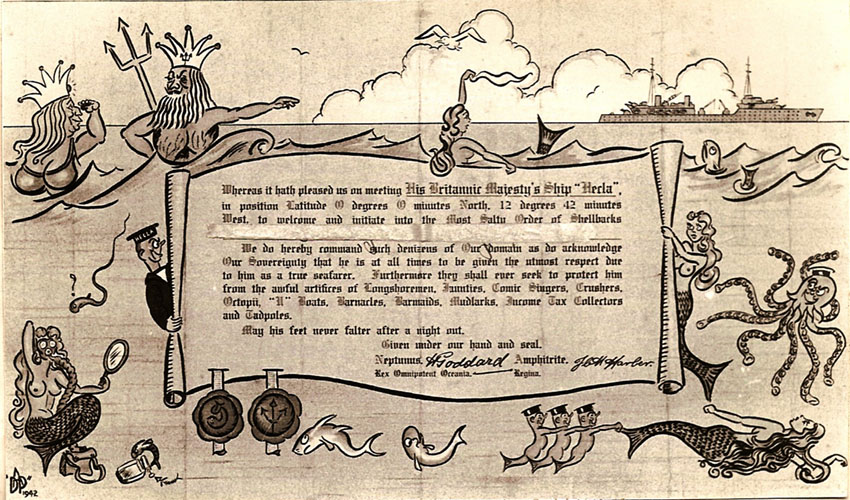
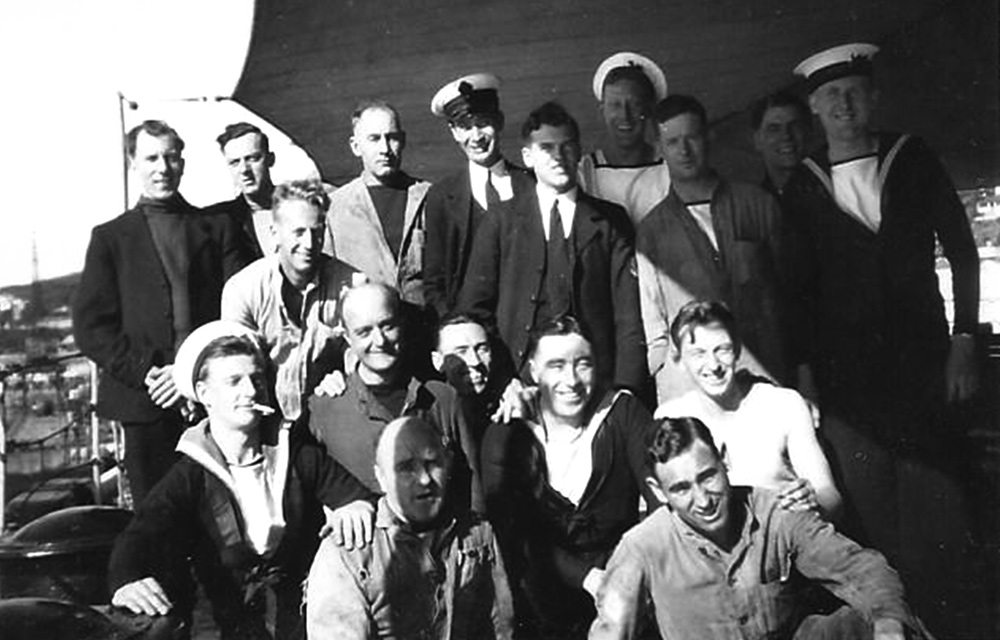
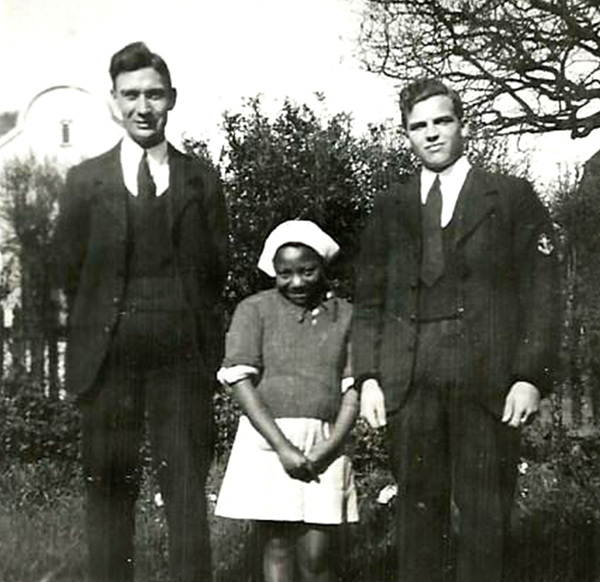
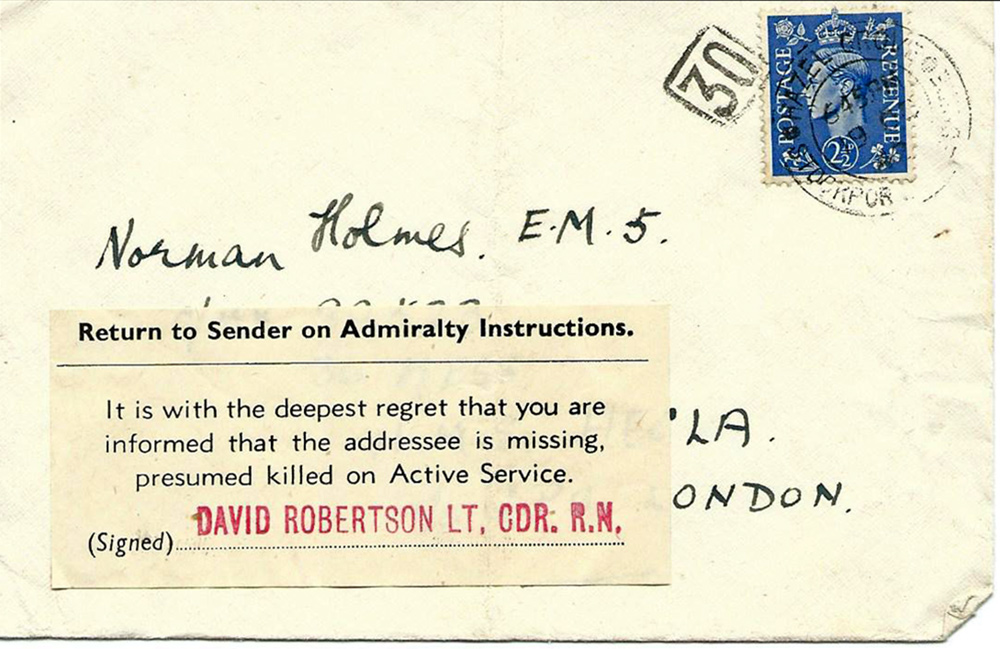
**** **** **** **** **** ****
My
mother re-married an old friend in October 1943, a former army major,
who by today's standards was fairly strict. However, he was also a very
kind and generous man and couldn’t have been a better father to
me. I have a half sister seven years younger than me who has
lived in New Zealand for most of her adult life. My mother died in 1970
on her 55th birthday and my stepfather died in 1979 at the age of
64. Shortly after my mother re-married in October 1943, we moved
down south, my stepfather having been brought up in Kilburn, north west
London. I still have many happy memories of my times spent as a
young lad in the north-country during frequent visits by steam train,
to stay with the Holmes and Weatherby (my mother’s maiden name) sides
of the family. We also had many family holidays during and after the
war in Pwllheli, North Wales, where my own father had done his initial
training.
My name was changed to my stepfathers’ surname of Golby by Deed Poll in
October 1948 when I was nearly seven years old, but the family name of
Holmes was retained as a middle name and has been passed on to our son,
now aged 40 and our grandson aged eight, so hopefully the original
family name will live on for many years to come in memory of the
sacrifice made by my dad, Norman, like so many others, for the good of
future generations. They will always be remembered.
His name is commemorated in perpetuity on the Chatham Naval Memorial, Panel Reference 63.3
Compiled and written by his son, David Norman Holmes Golby (aged 73)
Dated 5th August 2015